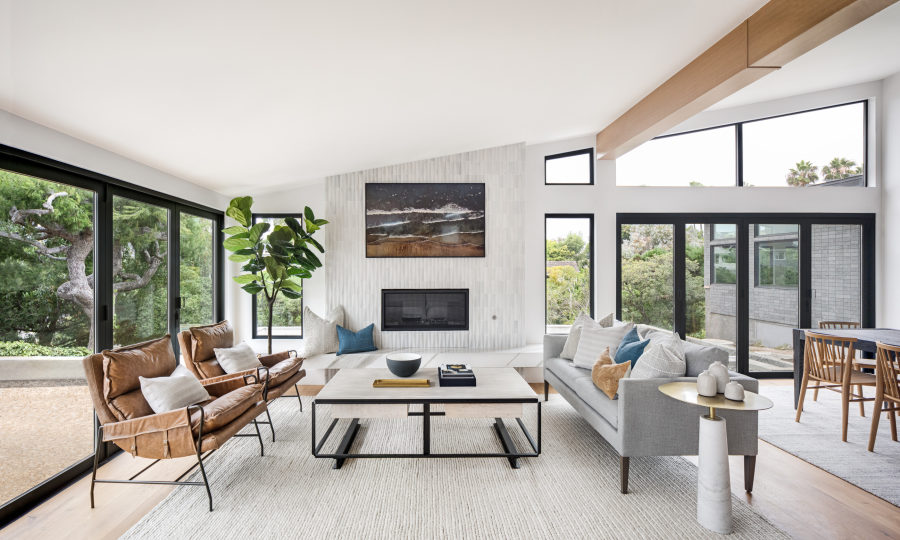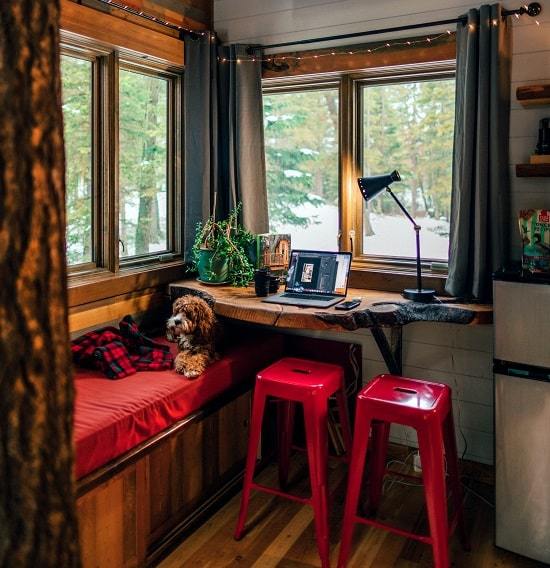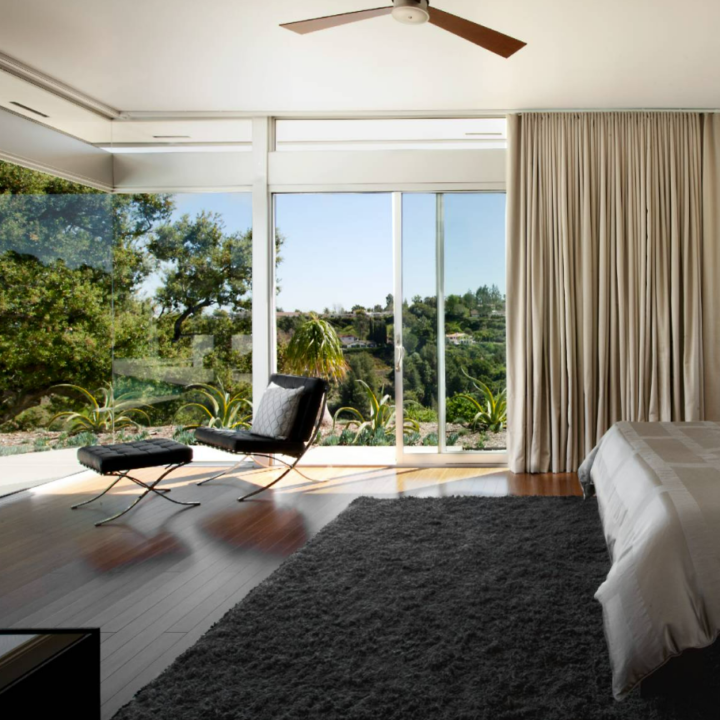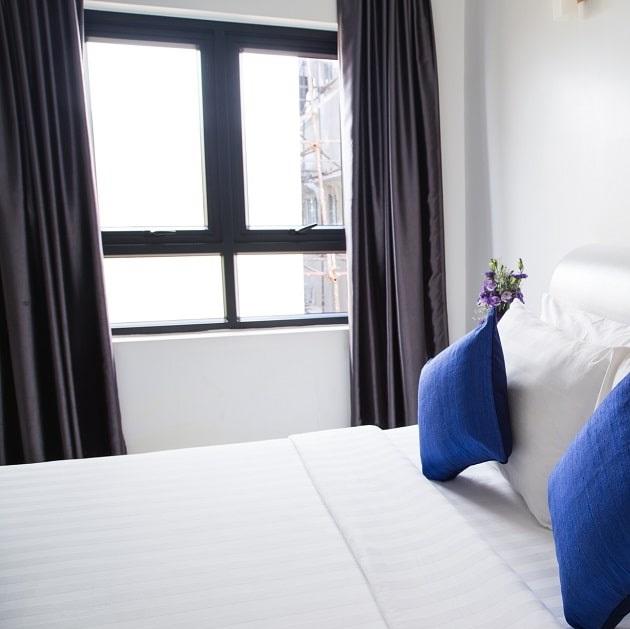Spiffy Speak
MID-CENTURY MODERN STYLE: HISTORY, PHILOSOPHY & ESSENTIAL TRAITS

An ingenious design style of the early twentieth century, roughly the 1940s-60s, mid-century modern design is all about functional, open, and uncluttered spaces. More aptly called a design movement, it caused a paradigm shift from the overdone traditional decor to a simplified design language of clean lines, simple shapes, and minimal decor. It worked towards democratizing design by prioritizing function over form in visual aesthetics and adopting advanced production techniques.
Down the centuries, newer design styles emerged, but certain elements of this iconic style remain popular. Offering a healthy mix of retro and modern, practicality and aesthetics, indoors and outdoors, natural and artificial, the mid-century modern design style often appears as a nostalgic tweak in contemporary design styles.
If you’re smitten by this style’s simplified aesthetics – perhaps a homemaker trying to incorporate its aesthetic in your home, or an influencer playing with the Vista Create Tool to create an informative booklet for your readers, we invite you to an enjoyable reading on its history, traits and rich philosophical core.
Mid-Century Modern: A Brief History
Understanding the origin of a design style often helps to assimilate its essence better. If history had been essayed differently, the mid-century modern design movement would have probably not seen its day. All credit goes to the landmark events of the early twentieth century.
It was a war-torn economically beaten world, further challenged by the baby boom, that had to reconstruct the battered society and economy with fewer resources at hand. There was also a growing understanding of human rights and social responsibility due to a collective contemplation of the war and its aftermath.
Traditional design style’s overembellishments, luxurious materials, and heavy excesses rung ostentatious against this scenario, besides being too expensive and non-practical for the thriving middle class. Affordable and accessible design was visibly the need of the hour.
Despite the trauma and struggle, optimism pervaded due to the foray into space and the invention of the computer and television. Add to this mix the availability of new synthetic materials like vinyl, plywood, and plastic and technologically-backed mass production techniques and you have all the ingredients needed for a ground-breaking design style.
Incorporating the wisdom of the 1920s’ German Bauhaus movement and the budding Scandinavian design style, the mid-century modern movement gradually took shape. It replaced superfluous details with svelte designs, made-to-order handcrafting with mass production, overly embellished architecture with pared-back structures, and meaningless excesses with minimal decor. High-quality, low-maintenance, and beautiful design with economic viability, functional efficiency, and easy accessibility was the goal of this ambitious modern design style.
Function-oriented aesthetics and harmony with other design styles make the mid-century modern design style ever-relevant. Its iconic furniture, simplified structures, open-plan concept, and decluttered design continue to influence architecture and design globally.
Essentials of Mid-century Modern Design Style
Post-war optimism and Atomic Age influence played a key role in the formation of the mid-century modern design style. This historical context is largely visible in its essential traits. Form follows function and materiality enjoys the spotlight. Structures and decor are pared-down and practical ease is emphasized.
The mid-century modern style is so ubiquitous that even if you know nothing about this design style, you’ll surely have its furniture in your home right now. Not just the quintessential Eames chair, but several design inventions of this style remain timeless. Let’s take a peek into the essential traits and time-honored gifts of the mid-century modern design style –
Streamlined Finishes
The departure from the swirls and twirls of traditional maximalist decor is the most evident trait of this style. Art, architecture, furniture, and design exhibited simple forms, clean lines, and gentle curves. The emphasis is on creating more airy spaces with less clutter and visual noise.
This simplicity helped in three ways: Reducing items to their base form reduced investment of resources and labor, making them more economical. The simple design was more adaptable to the newly invented mass-production techniques. For the end user, the design was made cheaper and regular maintenance easier as dust accumulation was minimized.
Minimal Decor
Since the post-war era was one of economic challenges and seeking maximum utilization of available resources, the decor was reduced to the bare minimum. Natural light was valued and the spaces were left minimally furnished and least decorated so that light could percolate into every nook and cranny.
Decor for decor’s sake is rare in a mid-century modern home and when present, it features organic and geometric shapes. Extensive gallery walls are given up for a single emphatic modern art installation that works as the focal point. Functional accessories are designed beautifully, but all the frills, laces, and artful additions exchanged for simple silhouettes and clean lines.
Openness in Architecture and Layout
Open floor plans and huge windows were for the first time introduced in this era. And, they are still found in contemporary design styles today.
The practical purposes of a growing middle-class family were better served in large seamlessly connected spaces than in secluded smaller rooms. The cost of production could also be kept to a minimum.
In today’s context, bigger windows, usually picture windows, continue to be introduced to integrate the outdoors into the indoors and let in plenty of light. Window treatments are often removed totally or kept on the lighter side in order to maximize the incoming light.
Bold Colors & Patterns
Neutral colors were – and still are – used extensively in this style. But the bold and generous pops of color are visually emphatic and effortless focal points. Anything from furniture upholstery to accent walls is seen as an opportunity to introduce a stark contrast or bright hue to the space.
Although there is no over-indulgence in patterns, the few that appear are grand in scale. They are intentionally oversized to garner attention and anchor the space. Graphic wallpapers and patterned floor tiles with saturated colors and clean simple lines are typical of the mid-century modern style.
A Mix of Natural & Artificial Materials
Since this style emerged at a time when synthetic materials became available and their low cost of production proved a godsend, we can see a carefully wrought intermingling of natural and artificial materials.
There is extensive use of wood, especially teak and walnut wood, in the flooring, wall paneling, and furniture. They are minimally finished so as to highlight their natural beauty. Metal and leather are other natural materials that are used substantially, and juxtaposed with the easily sourceable glass, fiberglass, plastic, molded plywood, and vinyl. The malleability of these newly available materials made many innovative designs possible which were hard to achieve with solid wood.
Iconic Furniture
The furniture in this style is not only designed to be practical and long-lasting but also sculptural and elegant. They are the most apt examples in the design world of a marriage between form and function.
Clean and sleek with no embellishments, furniture is often left in its bare-boned state to highlight the beauty of the materials. Multi-purpose furniture and nested tables are the timeless space-saving innovations of this style. Function-oriented ergonomic furniture was also the contribution of this style as newly available materials could be molded easily into any shape.
Tapered peg legs and hairpin legs were used to elevate the furniture from the floor for an unhindered flow of light in the space. Although solid wood was a popular choice, a mix of materials like wood and marble, plastic and metal, and wood and glass are classic mid-century modern looks.
The furniture produced in this era is a testimonial of the immense talent that was invested in the process of design. Several designers contributed of which Charles and Ray Eames and Hans Wegner are most prominent.
Final Words on a Timeless Design Style
It is visibly clear that the mid-century modern design style was a revolution more than just a decor style. It bears the imprint of the cultural and technological shifts of the age and the futuristic vision of the post-war world. It boldly converted its challenges into opportunities and made the most of the little that was available. The optimistic spirit of the times is visible in its innovative and creative ventures while the newly realized values of justice and human rights left no stone unturned to make design democratic and accessible. Although it is rare to see a home styled completely in the mid-century modern looks today, its influence on modern architecture, design, and furniture is phenomenal and enduring.
To learn about more decor styles and get interior design and window treatment tips and tricks, explore our Spiffy Speak blog page which is sure to serve as your personal interior design encyclopedia. Lastly, if you want to shop for new fabric window treatments or accessories like bed runners, curtain trims, tie-backs, or table runners, we wholeheartedly welcome you to the Spiffy world where we have over 3000 fabrics in store to match every decor style and taste. Stay spiffy and shop Spiffy Spools!
READ MORE: WINDOW TREATMENT IDEAS FOR ARCHED WINDOWS












